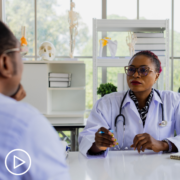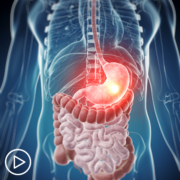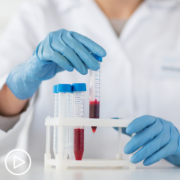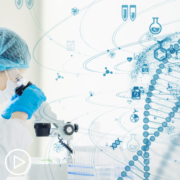Essential Testing Following a Gastric Cancer Diagnosis
Essential Testing Following a Gastric Cancer Diagnosis from Patient Empowerment Network on Vimeo.
What testing should newly diagnosed gastric cancer patients undergo? Expert Dr. Matthew Strickland discusses what is analyzed in biomarker testing and how immunotherapy works against cancer.
Dr. Matthew Strickland is a medical oncologist at Massachusetts General Hospital. Learn more about Dr. Strickland.
See More From INSIST! Gastric Cancer
Related Programs:

How Do Biomarker Test Results Impact a Gastric Cancer Treatment Plan? |

|

|
Transcript:
Katherine Banwell:
Dr. Strickland, what biomarker testing is standard following a gastric cancer diagnosis?
Dr. Matthew Strickland:
This is a very active area both for approved targets as well as from a research side of things. We’re trying to discover new biomarkers. I think it’s a critically important question. There are really three major biomarkers to help us make conventional treatment decisions. I’ll list them off first. Then, perhaps, I’ll break them down. The first is HER2. That’s H-E-R-2. Typically, folks have heard of this biomarker who are more in the cancer.
But the truth is that the same molecular alteration happens at a relatively high frequency for gastric cancer. It’s a critically important biomarker because if we determine that the tumor is HER2-positive, what this tells us is that the cancer is thriving based on this protein in the signaling machinery downstream of this protein. The reason we like to know that is we can then target it as a vulnerability of that cancer.
That certainly guides treatment options, specifically based on a HER2-positive result or negative. The next biomarker I want everyone to know about is called PD-L1. That stands for programmed death ligand 1. This is also a protein that’s expressed on the surface of cancer cells.
What we’ve come to understand is that high expression of this protein will interact with immune cells in such a way that it tells immune cells to turn the dial down on their activity. From the cancer cell standpoint, this is a very clever mechanism. Because in normal circumstances, our immune system actually can detect cancer and eliminate it to some degree.
However, when cancer cells choose, if you will, to overexpress this protein on their surface, it can act as a cloak. Suddenly, the immune system can no longer effectively detect and, of course, attack that cancer cell. This is critically important to know because if indeed a cancer cell is using this mechanism to survive, then we can also take advantage of this vulnerability.
We can add various immunotherapy therapeutics to the treatment plan. The last biomarker of three that I think up front are very important to know about is called mismatch repair status. Mismatch repair proteins are important proteins that we have in all of our cells. Nature basically gave us these proteins to fix small mistakes in the DNA replication.
That is to say when we’re growing and cells are dividing, DNA, which is the blueprint for our healthy cells, is copied. There’s a very low rate of mistakes, but there is a constant rate of mistakes. So, nature gave us what are called mismatch repair proteins that literally sit on the back of the enzymes that are doing the work.
They can detect mistakes; they can snip out those mistakes. They can reinsert the right base pairs to fix the proper DNA code. Now, if these proteins are lost or their function is impaired, this can be advantageous to a cancer cell. The reason is mutations and mistakes will pile up, and they don’t get corrected. This can lead to certain growth advantages for the cancer.
We know that gastric cancer at a relatively high frequency will utilize this mechanism to propagate itself. So, again, by knowing that the cancer is relying on this mechanism, we can directly take advantage of this as a vulnerability. We can improve the outcomes for the patients through their treatment.







